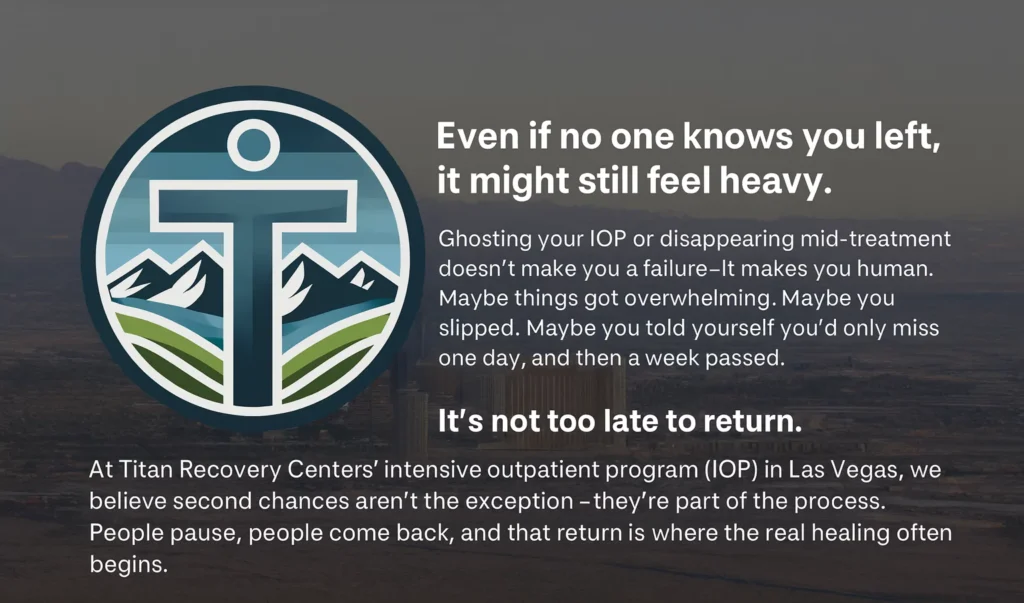Even if no one knows you left, it might still feel heavy.
Ghosting your IOP or disappearing mid-treatment doesn’t make you a failure—it makes you human. Maybe things got overwhelming. Maybe you slipped. Maybe you told yourself you’d only miss one day, and then a week passed.
If part of you is wondering whether it’s too late to return, here’s your answer: it’s not.
At Titan Recovery Centers’ intensive outpatient program (IOP) in Las Vegas, we believe second chances aren’t the exception—they’re part of the process. People pause, people come back, and that return is where the real healing often begins.
You’re Not the Only One Who Left
When you ghost a treatment program, shame can get loud fast. You might assume everyone else stuck with it. That you were the only one who couldn’t handle it. That maybe you just don’t “fit” in recovery.
Here’s the truth:
Dropping out of IOP is more common than you think. We see it weekly. Not because people don’t care—but because life is complex. You might be juggling a job, family, health issues, or mental health symptoms that aren’t linear or predictable.
“I didn’t mean to disappear. I just hit a wall. Two missed sessions turned into two weeks, and I felt too ashamed to call.”
— Former IOP Client, 2023
You’re not the only one. And you won’t be the last. But you can be one of the many who finds their way back.
Why IOP Is Designed to Be Reentered
Unlike inpatient treatment, IOP is built for flexibility. That doesn’t just mean flexible schedules—it means flexible humanity. People don’t just graduate in neat arcs. They pause. They change jobs. They get overwhelmed. They relapse. And they come back.
At Titan, we structure IOP to accommodate those messy middles. That includes:
- Low-barrier reentry calls (no pressure, just options)
- No judgment for time missed
- Supportive re-engagement plans based on where you are now
- Privacy and discretion if you’re worried about being recognized
Whether you’re local to the city or looking for IOP in Henderson, NV or North Las Vegas, we’ll meet you with the same welcome.
What Rejoining Might Actually Look Like
If you’re picturing a tense confrontation or a guilt trip, take a breath. Rejoining doesn’t have to look like that. Here’s a more realistic picture:
Step 1: You reach out—your way.
Call, email, or even send a message through our website. You don’t need to explain everything.
Step 2: We listen.
We’ll ask how you’re doing now, not what went wrong then. We don’t need an apology. We want to know how to support you.
Step 3: We co-create a reentry plan.
You might rejoin a group you left or start fresh. You might ease in with 1:1s. We’ll build around your bandwidth.
Step 4: You show up—awkwardness and all.
And we’ll be glad to see you. No side-eyes. No soapboxes. Just clinicians and peers who get it.
You Don’t Have to Feel “Ready” to Come Back
One of the biggest myths about returning to treatment is that you have to feel ready. Like you have to walk in strong, or committed, or crystal clear on your goals.
You don’t.
Returning just means you’re willing to be supported again. That’s it.
“They didn’t guilt me. They just asked how I was doing and what I needed. It made it easier to walk through the door again.”
— IOP Client, Spring Valley
Sometimes the most powerful thing you can do is try again, even when you’re still unsure. Especially when you’re unsure.

There’s Room for the Messy Middle
Healing isn’t tidy. It isn’t linear. It doesn’t look like a graph that climbs in perfect progression. Sometimes it looks like starting over. Or starting sideways. Or starting with your camera off for the first week back.
We know that people returning to IOP may be dealing with:
- Lingering guilt or shame
- A return to using
- Isolation or embarrassment
- Depression or executive dysfunction
- Life circumstances that made treatment feel impossible
That doesn’t disqualify you. It’s why IOP exists.
Quick Tips for Rejoining IOP Without Shame
Here are a few low-pressure ways to ease back in:
Reentry Tips:
- Leave a voicemail outside of office hours if talking feels too much
- Start with a one-on-one session before rejoining group
- Ask if you can attend one session before deciding to fully restart
- Remind yourself: There’s no punishment here—only people who want to help
How IOP Can Feel Different This Time
Coming back gives you a chance to rebuild on your terms. Many clients who return say they feel more present, more honest, and less afraid of being “behind.” You may find:
- You’re more open now that you’ve seen what happens without support
- You ask for help faster instead of trying to muscle through alone
- You relate more deeply to others who’ve hit pause before too
It’s not about catching up. It’s about reconnecting.
FAQ: Rejoining IOP at Titan Recovery Centers
What if I left during a relapse? Will I be judged?
No. We understand relapse and setbacks happen. You won’t be judged. We’ll simply meet you where you are now and help you take the next step forward.
Do I have to start the whole program over?
Not necessarily. Your reentry plan depends on how long you were away, what you’ve processed since, and what you need now. Some clients pick up where they left off; others start fresh. Either way, we’ll guide you.
I’m embarrassed. Will the group treat me differently?
Most clients are just glad to see someone return. Many have been there themselves. And your clinician will help set the tone for reintegration if needed.
Can I restart IOP if I moved to a different part of Las Vegas?
Yes. Whether you’re now based in Henderson, North Las Vegas, or another nearby area, we can help coordinate the best location and schedule for you.
What if I ghost again?
You won’t be kicked out forever. Every attempt to return is valid. We’ll always talk through what happened and see how we can support you differently next time.
The Door Is Still Open—Whenever You’re Ready
You don’t need to feel strong, sure, or even sober to come back. You just need to reach out. We’ll take it from there.
📞 Ready to take that step? Call (888) 976-8457 or visit our IOP services in Las Vegas, Nevada to learn more.




